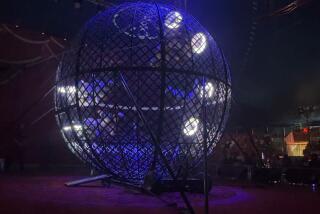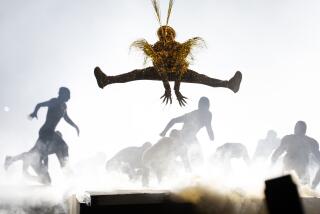LE CIRQUE DU SOLEIL: SOMETHING NEW UNDER THE SUN : New-Wave, Old-Style French-Canadian Troupe Opens Los Angeles Festival With a Circus That ‘Reinvents’ the Real Thing
The advance word on Le Cirque du Soleil, the New-Wave French-Canadian troupe which opened the Los Angeles Festival in high style on Thursday night, was that they had “reinvented the circus.”
There was something a little worrying in the phrase. On the one hand, we’ve had it with tired elephants, unfunny clowns, sullen trapeze acts and morbid sideshows. On the other hand, a circus that isn’t earthy, even a bit coarse, isn’t a circus. You didn’t want some high-minded group in mime makeup reinventing it out of existence.
Not to worry. There’s nothing precious about Le Cirque du Soleil. This is a lean, muscular, one-ring traveling circus playing “under canvas,” as the old-timers did. (The company will be camped on the edge of Little Tokyo for the duration of the festival--big top, cook-tent and all.)
The old-timers knew what they were doing. Something about being under a tent loosens audiences up. You saw, Thursday night, how much went out of the circus experience when the big shows switched to playing sports arenas back in the ‘50s.
One thing was missing from the old days: smells. Le Cirque carries no livestock. But its acrobats drip real sweat, you can buy real popcorn in the outside tent, and those seated ringside may get squirted with real Canadian water by a clown named Benny LeGrand. (Some of the people at Thursday’s invitational opening didn’t find this too amusing.)
So it’s a little raucous, as a circus ought to be. And it obeys our prime command as a circus audience: Astonish me. It also obeys our hidden command: Scare me. There’s a moment when a female highwire artist seems to lose control, 60 feet up in the air, and, oh, God, you can’t look. But you do.
Le Cirque du Soleil speaks to the lower centers, the impulse to gasp, to gawk and to wonder how they do that. Rather than riding horses around the ring, the show has a bicycle act, with the performers leaping from bike to bike and doing incredible “wheelies.”
At one point, 13 people are rolling around the ring on one bike, suggesting some kind of living tree. How do they do that? How much practice did that take?
They make it look easy. But they’re smart enough not to make it look too easy. The chair-balancing number builds slowly, one chair at a time, like a house of cards going up--one breath could bring it all down, and with it the man on top. So you hold your breath.
The focus is much more intense than it would be if this were a sidebar act in a Ringling Brothers extravaganza, with its blaring band and its welter of concurrent skills. Here Le Cirque returns to the European tradition of circus, where one thing happens at a time--and it had better be good.
Nothing mentioned so far, however, gets to the company’s central quality. One hesitates to call it “poetry,” but that’s what it is. Even as a child, I never saw a circus that showed you why Toby Tyler wanted to run off to the circus. This one has it.
Not only do we see the traditional performing skills, executed in a particularly upfront way (as when Eric Varelas and Amelie Demay do their double handstands: pure muscle, pure concentration. We tighten our own neck muscles as they take each other’s weight).
We also see the wonder of possessing such skills. The show has a theatrical frame that’s not just a gimmick. A bunch of ill-coordinated yokels like ourselves blunder into a circus ring and are transformed (smoke effects here) into circus performers--graceful, glamorous, above the laws of gravity.
It’s a whimsy that could be overplayed. It isn’t. There’s an undertone of eeriness here, as there is to many of the show’s images. The chair-balancing number, for instance, features a chair so huge that anyone who clambers onto it shrinks to child size.
Not necessarily a reassuring notion. Again, it’s funny when Denis Lacombe steps up to conduct the “1812” Overture and discovers that his podium is a trampoline, but it’s also the conductor’s nightmare--including losing his pants.
Rene Dupere’s synthesizer music also has a dark streak, not playing against the danger of some of the highwire acts, as the cheerful blare of the traditional circus band does, but playing on our nerves.
So do the lights. Circus lighting is traditionally rather plain. Le Cirque du Soleil molds its performers, throws rainbows on them, backlights them.
My loudest gasp in fact involved a light change. Not a light trick. Masha Dimitri lay back on the slackwire, the lights switched to a new position from high up and behind, and you suddenly were aware of her as floating in air--only one filament bearing her up.
Interesting that Le Cirque’s directors, Guy Caron and Guy Laliberte, think that their show has “demystified” circus. Actually they’ve remystified it, without taking out the fun. How did they do that?
LE CIRQUE DU SOLEIL
The French Canadian circus, at the Los Angeles festival. General manager Guy Laliberte. Artistic director Guy Caron. Original music Rene Dupere. Music director Benoit Jutras. Technical director Richard Bouthillier. Assistant Jean-Pierre Peletier. Costumes Michael Crete. Choreographer Debbie Brown. Stage director Franco Dragone. With Denis Lacombe, Michel Barfrette, Marc Proulx, Benny Le Grand, Eric Varelas and Amelie Demay, The Andrews, Zhao Yanping, Zhao Yanyan and Zhao Yanyang, Noemie Gelinas and Corinne Pierre, Christopher Suszek and ensemble. Plays Tuesdays-Sundays at 8 p.m. Matinees as follows: Today and Sunday, 2 p.m.; Monday, noon and 4 p.m.; Sept. 12, 1 and 4:30 p.m.; Sept. 13, 2 p.m.; Sept. 19, 1 and 4:30 p.m.; Sept. 20, 2 p.m. Closes Sept. 27. Tickets $5-$10 (children), $12-$17.50 (adults). Circus Big Top tent, 1st and Alameda streets; (213) 687-4764.
More to Read
The biggest entertainment stories
Get our big stories about Hollywood, film, television, music, arts, culture and more right in your inbox as soon as they publish.
You may occasionally receive promotional content from the Los Angeles Times.










